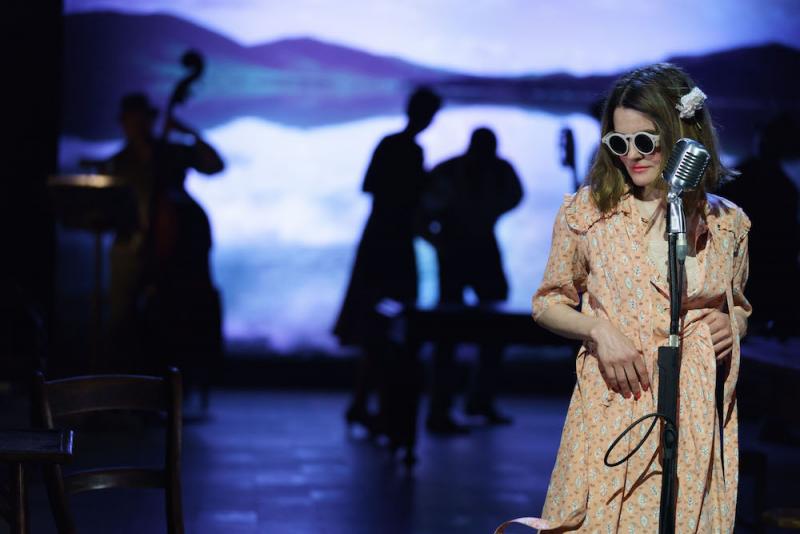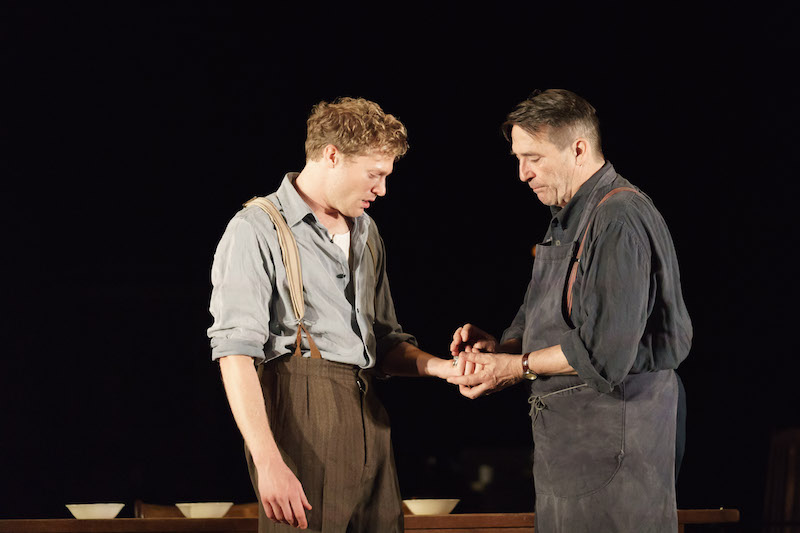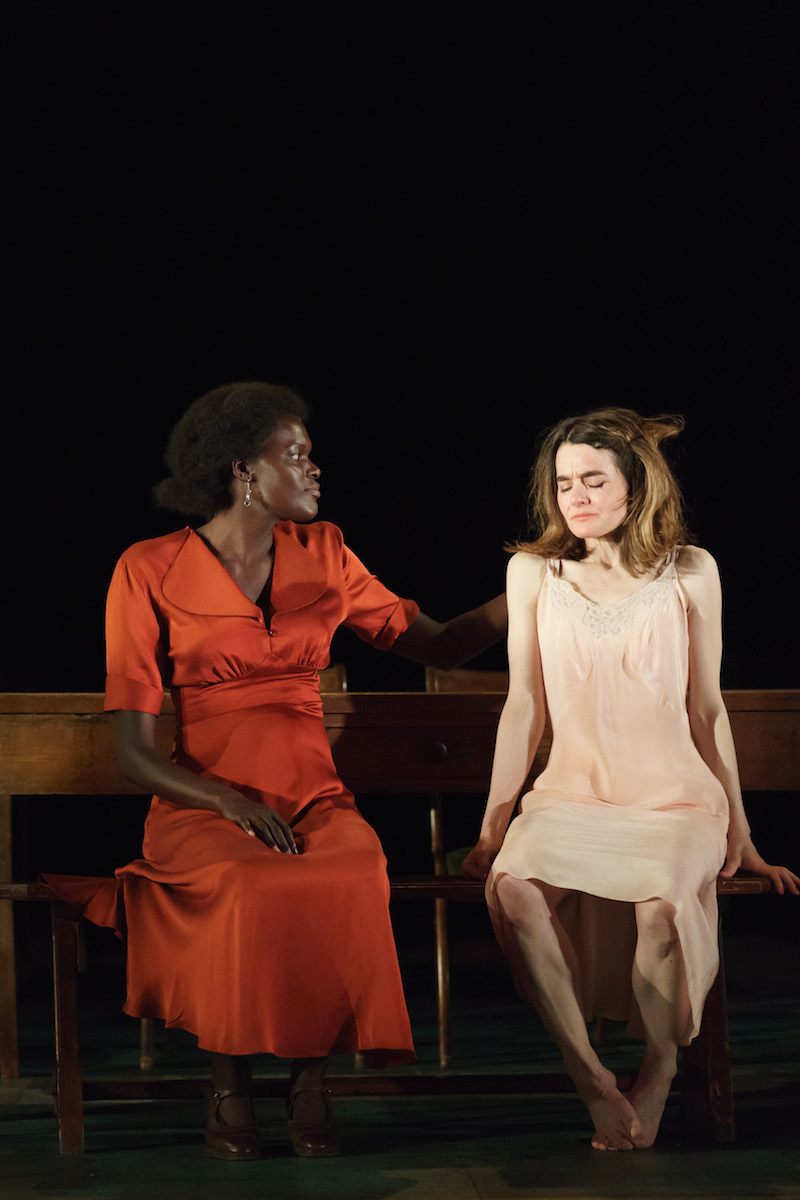Girl from the North Country, Noël Coward Theatre review - Bob Dylan fuels a dreamlike drama | reviews, news & interviews
Girl from the North Country, Noël Coward Theatre review - Bob Dylan fuels a dreamlike drama
Girl from the North Country, Noël Coward Theatre review - Bob Dylan fuels a dreamlike drama
Conor McPherson's latest play is blowin' in the wind

The rolling stone is now at home in the West End, as Conor McPherson’s inimitable dramatic take on Bob Dylan transfers from the Old Vic, where it premiered last summer.
Set in Dylan’s hometown of Duluth, Minnesota, in the Depression-era 1930s, writer/director McPherson gathers a desolate gaggle of folks in a rundown guesthouse: owner Nick Laine (Ciarán Hinds, pictured below with Sam Reid), struggling to stay afloat; wife Elizabeth (Shirley Henderson), suffering from dementia; their hard-drinking son Gene (Sam Reid) and mysteriously pregnant adopted daughter Marianne (Sheila Atim); plus numerous guests and neighbours – all running from creditors, the past, or an inevitable fate. The sheer size of the ensemble, and the use of almost mythic archetypes, renders the characterisation more of a breadth-not-depth affair. The boozy writer longing for escape (“Hemingway”, sniffs his father derisively) is instantly recognisable; this iteration doesn’t stray far from tradition. Nor does the devious bible salesman, wronged boxer, sidelined mistress, local doctor spouting Thornton Wilder-esque narration, or family with a deep, dark secret. Some revelations are explosive; others, infuriatingly, simply dissipate.
The sheer size of the ensemble, and the use of almost mythic archetypes, renders the characterisation more of a breadth-not-depth affair. The boozy writer longing for escape (“Hemingway”, sniffs his father derisively) is instantly recognisable; this iteration doesn’t stray far from tradition. Nor does the devious bible salesman, wronged boxer, sidelined mistress, local doctor spouting Thornton Wilder-esque narration, or family with a deep, dark secret. Some revelations are explosive; others, infuriatingly, simply dissipate.
Yet the music transcends these narrative bumps, making the familiar feel epic, and the sketchy stirringly poetic. Around 20 songs – from across the Dylan decades – form the backbone of the show, with the actors mostly singing straight out to the audience while clasping vintage mics, accompanied by an onstage, period-appropriate band. There are some literal links (of course the boxer heralds “Hurricane”), but the most effective choices, gorgeously arranged by Simon Hale, instead catch onto a mood, thought or feeling – music suddenly illuminating drama via a sideways glance, and vice versa.
Desire and frustration war in “Went to See the Gypsy”, as a widow (the passionate Debbie Kurup) – waiting for a promised inheritance, and for her lover to make up his mind – stirringly vents, while the golden-voiced Atim (pictured below with Shirley Henderson) draws every ounce of longing from “Tight Connection to My Heart”. Her fascinating character, Marianne, a black child adopted by a white family, particularly suffers from the hazy storytelling, but in such musical moments, she crystalises perfectly.
 Music, too, emphasises the themes of ambiguity of action, and the complexity of humanity. Jack Shalloo’s childlike Elias is a confident charmer when belting out “Duquesne Whistle”; Bronagh Gallagher’s previously affluent wife forced into begging for extended credit reveals more bitter and clear-eyed depths through her powerhouse vocals and drumming; Arinzé Kene’s prickly, exasperated boxer becomes focussed and commanding. Claudia Jolly’s sweetheart Kate – neatly accessorised in matching blues, in contrast to the shambolic Gene – complements him so exquisitely in song that her loss is felt. Dramatically, her hasty disappearance is a flaw; musically, it’s a corresponding ache.
Music, too, emphasises the themes of ambiguity of action, and the complexity of humanity. Jack Shalloo’s childlike Elias is a confident charmer when belting out “Duquesne Whistle”; Bronagh Gallagher’s previously affluent wife forced into begging for extended credit reveals more bitter and clear-eyed depths through her powerhouse vocals and drumming; Arinzé Kene’s prickly, exasperated boxer becomes focussed and commanding. Claudia Jolly’s sweetheart Kate – neatly accessorised in matching blues, in contrast to the shambolic Gene – complements him so exquisitely in song that her loss is felt. Dramatically, her hasty disappearance is a flaw; musically, it’s a corresponding ache.
But best of all is Henderson. Riveting even when Elizabeth is peripheral to the action, she creates a detailed portrait of someone lost inside themselves: sometimes feral or infantile, sometimes inappropriately sexual, and then startling in her sage lucidity. In song, she’s a swaggering, all-knowing rock star – playfully nailing “Like a Rolling Stone”, heartrendingly eloquent in “Forever Young”. Hinds’s seemingly stoic but haunted Nick doesn’t sing; instead, the rare quiet moments where he stops bustling and babbling speak volumes.
Of the new cast, Adam James doesn't match Ron Cook’s mature authority as the yarn-spinning doctor; Finbar Lynch could be more slippery as the devilish man of god; and, as the unpredictable Mr Burke, David Ganly lacks Stanley Townsend’s all-important hint of icy ruthlessness. But the ensemble as a whole is superbly drilled by McPherson and movement director Lucy Hind: seamlessly linking vignettes, creating striking tableaux, toe-tapping group elation and spine-tingling harmonies, and adding to the pervading sense of a liminal netherworld – a purgatory of sorts, until its inhabitants find a way to break their stasis.
Dying is described as like stepping “through a glass wall”, and Rae Smith’s designs include wonderful translucent flats. Religious iconography also seeps through: a picture of telegraph poles dominating like giant crosses; a table laid like the Last Supper. If necessarily more compact than the Old Vic staging – and thus losing the beautiful strangeness of a wide-open space – there’s a stronger sense of connection that helps combat the chillier elements of this dreamlike drama, and bolsters the gentle sentiment that to soldier on, with and for one another, through pain, uncertainty, hardship and disillusionment, is a special kind of heroism.
The future of Arts Journalism
You can stop theartsdesk.com closing!
We urgently need financing to survive. Our fundraising drive has thus far raised £49,000 but we need to reach £100,000 or we will be forced to close. Please contribute here: https://gofund.me/c3f6033d
And if you can forward this information to anyone who might assist, we’d be grateful.

Subscribe to theartsdesk.com
Thank you for continuing to read our work on theartsdesk.com. For unlimited access to every article in its entirety, including our archive of more than 15,000 pieces, we're asking for £5 per month or £40 per year. We feel it's a very good deal, and hope you do too.
To take a subscription now simply click here.
And if you're looking for that extra gift for a friend or family member, why not treat them to a theartsdesk.com gift subscription?
more Theatre
 Hamlet, National Theatre review - turning tragedy to comedy is no joke
Hiran Abeyeskera’s childlike prince falls flat in a mixed production
Hamlet, National Theatre review - turning tragedy to comedy is no joke
Hiran Abeyeskera’s childlike prince falls flat in a mixed production
 Rohtko, Barbican review - postmodern meditation on fake and authentic art is less than the sum of its parts
Łukasz Twarkowski's production dazzles without illuminating
Rohtko, Barbican review - postmodern meditation on fake and authentic art is less than the sum of its parts
Łukasz Twarkowski's production dazzles without illuminating
 Lee, Park Theatre review - Lee Krasner looks back on her life as an artist
Informative and interesting, the play's format limits its potential
Lee, Park Theatre review - Lee Krasner looks back on her life as an artist
Informative and interesting, the play's format limits its potential
 Measure for Measure, RSC, Stratford review - 'problem play' has no problem with relevance
Shakespeare, in this adaptation, is at his most perceptive
Measure for Measure, RSC, Stratford review - 'problem play' has no problem with relevance
Shakespeare, in this adaptation, is at his most perceptive
 The Importance of Being Earnest, Noël Coward Theatre review - dazzling and delightful queer fest
West End transfer of National Theatre hit stars Stephen Fry and Olly Alexander
The Importance of Being Earnest, Noël Coward Theatre review - dazzling and delightful queer fest
West End transfer of National Theatre hit stars Stephen Fry and Olly Alexander
 Get Down Tonight, Charing Cross Theatre review - glitz and hits from the 70s
If you love the songs of KC and the Sunshine Band, Please Do Go!
Get Down Tonight, Charing Cross Theatre review - glitz and hits from the 70s
If you love the songs of KC and the Sunshine Band, Please Do Go!
 Punch, Apollo Theatre review - powerful play about the strength of redemption
James Graham's play transfixes the audience at every stage
Punch, Apollo Theatre review - powerful play about the strength of redemption
James Graham's play transfixes the audience at every stage
 The Billionaire Inside Your Head, Hampstead Theatre review - a map of a man with OCD
Will Lord's promising debut burdens a fine cast with too much dialogue
The Billionaire Inside Your Head, Hampstead Theatre review - a map of a man with OCD
Will Lord's promising debut burdens a fine cast with too much dialogue
 50 First Dates: The Musical, The Other Palace review - romcom turned musical
Date movie about repeating dates inspires date musical
50 First Dates: The Musical, The Other Palace review - romcom turned musical
Date movie about repeating dates inspires date musical
 Bacchae, National Theatre review - cheeky, uneven version of Euripides' tragedy
Indhu Rubasingham's tenure gets off to a bold, comic start
Bacchae, National Theatre review - cheeky, uneven version of Euripides' tragedy
Indhu Rubasingham's tenure gets off to a bold, comic start

Add comment